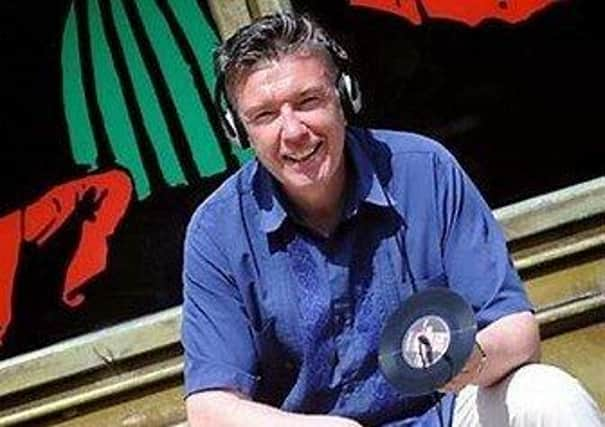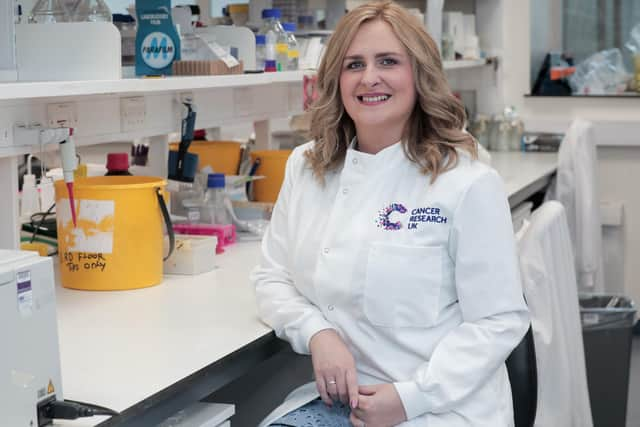The Undertones Mickey Bradley joins cancer-fighting scientist Dr Emma Kerr to support Race for Life


The annual Belfast Race for Life was among 400 mass participation events which organisers Cancer Research UK cancelled this year to protect the country’s health during the Covid-19 outbreak. The charity is expecting a £160m drop in income in the year ahead, with a £44m cut to life-saving research funding already.
Now to help tackle the devastating loss, Dr Emma Kerr from Queen’s University joins with survivor Mickey Bradley to encourage women and men to raise funds by completing their own Race for Life 5K in their nearest green space on Saturday September 26.
Advertisement
Hide AdAdvertisement
Hide AdThe cancer-fighting scientist, who is funded by Cancer Research UK know just how important that funding is in helping her to give hope to bowel cancer patients.


There’s no doubt that Mickey Bradley is one of Derry’s best known citizens. As the bassist in iconic punk rock band The Undertones, his musical talent is without exception, and his current role as producer and presenter at BBC Radio Foyle means his voice is known the city over.
Yet it may not be widely known that Mickey was diagnosed with bowel cancer in November 2005.
Recalling the moment he realised something was wrong, he said: “I was out with some friends from Radio Foyle when I started to get terrible cramps in my stomach,” he said. “ I spent the next while at the bathroom and was astonished to see that I was passing fresh blood.
Advertisement
Hide AdAdvertisement
Hide Ad“I instantly knew something wasn’t right and that I needed to see a doctor. When I did so, it was a locum female doctor and when she asked if I wanted to be examined I declined, purely because she was a woman.
“The next time it happened, some months later, I returned to the doctors and this time was seen by a doctor who I knew well. He asked no questions but asked me to get up on the couch. There was no choice but to be examined.
“He immediately made me an appointment at Altnagelvin Hospital for a colonoscopy.”
It was at this stage that Mickey finally told his wife Elaine that he had even been to the doctors at all.“I didn’t want to worry her,” he added, “but it was the colonoscopy which started to worry me.
Advertisement
Hide AdAdvertisement
Hide Ad“Throughout the colonoscopy I was thinking, ‘This isn’t too bad’, but at the end the lady doing the scan then said she thought she saw something. She couldn’t be certain but there was a possibility there was something there. It was then that I began to think ‘cancer’.”
Unfortunately Mickey’s thoughts proved to be right, as a few days later he sat in front of his oncologist to be told that it was in fact colorectal cancer - commonly known as bowel cancer.
Mickey explains, “He confirmed that they thought there was something there, but went on to say that they didn’t know if it had spread to the liver or other parts of my body.
“It was the word ‘spread’ that worried me then. I thought I was in for a long, lingering death.”
Advertisement
Hide AdAdvertisement
Hide AdTwo weeks of waiting followed before, thankfully, further tests revealed that Mickey’s cancer was confined to his bowel.
“Those two weeks were the longest of my life. I had been advised to tell my family, and I thought the doctor meant that I should tell them because I was dying, but I soon gathered that he wanted them to be tested because bowel cancer is hereditary.”
Mickey then had surgery to remove part of his bowel followed by chemotherapy.
To-day he is well and would encourage anyone who has concerns to see their GP right away.
Advertisement
Hide AdAdvertisement
Hide AdI guess it is fitting that Dr Emma Kerr’s research project, which will last six years, is working to establish whether drugs frequently used to manage other conditions might be effective in treating some people with bowel cancer.
She explained: “With the new screening programme for bowel cancer, there are some people who are picked up earlier and that’s great.
“However, there are still those who are diagnosed at a later stage and they might need surgery and chemotherapy.
“We want to improve outcomes for patients and we’ve been looking at why some people respond to treatment and others don’t do so well, and we’re asking is there another drug they could take on top of the chemotherapy that they would do better on.
Advertisement
Hide AdAdvertisement
Hide Ad“We’re looking at the likes of statins and diabetes medication.
“The idea is that these drugs are already widely used and we know they’re safe but they could make a huge difference to how we treat bowel cancer patients.”
Having studied biomedical science at Queen’s University, Emma was able to work in cancer research in her final year. Recalling how that experience influenced her career path she said, “As soon as I walked into the lab I knew straight away that I wanted to do something in that area.”
She stayed in Belfast to do her PHD and was fortunate to be able to work with two of the most eminent cancer researchers in the world, Professor Dan Longley and the late Professor Patrick Johnston, before taking up a post in Cambridge.
Advertisement
Hide AdAdvertisement
Hide AdShe spent six years at the University of Cambridge studying lung cancer therapy and resistance when she learned of an incredible funding opportunity.
Emma secured a prestigious fellowship from Cancer Research UK to return to Northern Ireland to start her own research group in Belfast.
“The Johnston Centre for Cancer Research in QUB is the perfect place to take on this work, building on years of knowledge and the fantastic resources and networks between the research and clinical teams working on bowel cancer here, with the added advantage of getting to come home.”
Cancer Research UK expects to see its fundraising income decline by up to 25 per cent in the next financial year as a direct result of the COVID-19 pandemic.
Advertisement
Hide AdAdvertisement
Hide AdJean Walsh, Cancer Research UK spokesperson in Northern Ireland said: “We remain tirelessly committed to making progress for people affected by cancer but now more than ever, support from the public will be vital. We simply will not be able to continue funding our life-saving work without it.
“Since it began in 1994, Race for Life – in partnership with Tesco, has raised over £890m for Cancer Research UK’s life-saving work. This money helps to support vital research to develop gentler and more effective treatments for cancer. We’re incredibly grateful to everyone who has taken part and hope their support will continue.
The charity is expecting a staggering £160 million drop in income in the year ahead with a £44 million cut to life-saving research funding already.
Now to help tackle the devastating loss, undeterred women and men are vowing to raise funds by completing their own Race for Life 5K in their nearest green space on Saturday September 26th. They plan to take part outdoors either alone or in small, socially distanced groups - but all on the same day - to help people with cancer. Supporters can visit raceforlife.org and sign up free for a “Very 2020 Race for Life.”
Advertisement
Hide AdAdvertisement
Hide AdA live broadcast on the Cancer Research UK Race for Life Facebook page at 9.30am on Saturday September 26th, will include an energiser from a fitness expert as well as inspirational messages of support from people who have been through cancer. Participants are then free to set off on their own Race for Life. Organisers are also inviting participants to share photos and videos on social media using the hashtag, #Very2020RaceForLife.
Every hour someone in Northern Ireland is diagnosed with cancer.. that’s around 9000 every year *But the good news is more people are surviving the disease now than ever before.
Jean continued “Vital cancer research has been delayed this year, but cancer is still happening right now and we won’t let 2020 stop us.
“Whatever the hurdle, we’ll keep going and we’d urge as many people as possible in the North West to join us for a Very 2020 Race for Life on September 26, united with a determination to beat cancer together.Cancer Research UK’s life-saving work relies entirely on the public’s generous support. The charity was able to spend over £2 million last year in Northern Ireland on some of the UK’s leading scientific and clinical research.
Advertisement
Hide AdAdvertisement
Hide AdRecalling his own cancer journey Mickey said “ It is thanks to research that I am here today and it upsets me to hear that vital cancer research has been delayed this year. Even though people may still be apart we can unite with a common goal to fund life-saving research.”
Clearly passionate about her work, and optimistic that it might offer hope to patients in the future, Emma echoes those thoughts“ I know the importance of fundraising by members of the public. It is only through their generosity that I am able to continue my potentially life-saving work.”
To take part, visit raceforlife.org or call 0300 123 0770. Join in and share with #Very2020RaceForLife